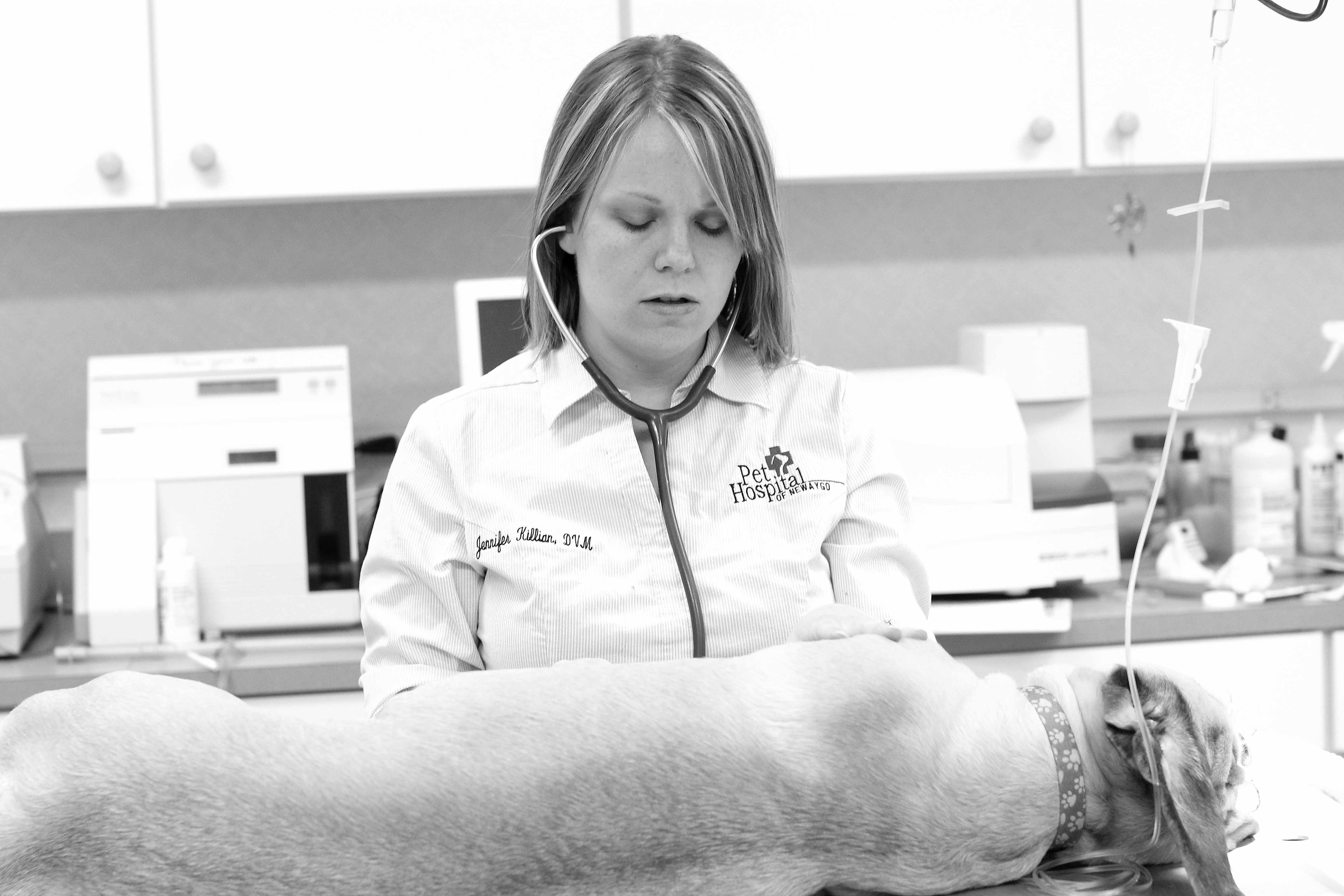Lifelong learning at Purdue University expands the frontier of higher education

Alumna Jennifer Killian, owner and head veterinarian of Newaygo Veterinary Services, pursued graduate training at Purdue after substantially growing her veterinary practice and launching a family business.
Jennifer Killian, owner and head veterinarian of Newaygo Veterinary Services in Newaygo, Michigan, had been a practicing veterinarian for over a decade when she bought a second veterinary practice and merged it with her first practice.
“In the veterinary industry, we don’t receive a ton of management education as part of veterinary education,” said Killian, who earned a BS from the University of Michigan and a DVM from Michigan State University before coming to Purdue University for a certificate and MBA. “I went from having three employees to having about 15 employees, and I really felt that there was more I needed to learn about how to run a business well.”
Killian was in a position that many professionals find themselves in after a few years in the workforce. Workers who advance into new roles or work in an industry that is rapidly evolving may have gaps in their knowledge and either choose to return to school or are sent back by their employers to develop new expertise.
Continuing education to tune up skills or to support a career pivot is a growing trend, and the modalities and paths are becoming as diverse as student and employer goals and outcomes.
At Purdue, there are increasingly more, and more diverse, opportunities available for adult learners who know what they need and have limited time to get it done. Flexibility in graduate education and the explosion of online learning has facilitated an expansion of options far beyond a time- and location-bound education that culminates in the traditional master’s or PhD.
“The academy has traditionally focused on fulltime, largely residential students, especially in graduate education,” said Gerry McCartney, executive vice president for Purdue Online. “Adult learners can’t work that way. They have jobs, families, other commitments. Yet today’s economy dictates that they’re going to need to refresh and enhance their skills regularly. Because of rapid changes, people out of school for a few years are at a disadvantage if they don’t keep up. We’re creating paths to lifelong learning that work for them, whether it is self-paced professional master’s or single- and multi-course graduate certificate programs built around continually evolving in-demand skills like cybersecurity.”
Unbundling degrees, customizing credentials
While some students still just want a traditional course or two, others are pursuing a host of nontraditional educational units for credit or noncredit—later converting them to university credit, if desired, and stacking them into micro-credentials and eventually a degree. The Purdue Online Portal, a unified access point for Purdue’s online offerings, features a growing array of such programs, including professional development possibilities in numerous fields, from agriculture and engineering to veterinary medicine and computer science.
“The way I would describe it is unbundling degrees,” said James Mohler, associate dean of The Graduate School. “Often, students who have been out for a while don’t want to come back for a full degree. They already have a lot of the skills, knowledge, and abilities that equate certain parts of the degree. By devolving the degree to small chunks, basically it’s allowing customized credentialing. It allows them to really pick and choose the things that they want, while demonstrating what they already know or know how to do.”
Students might take courses through Purdue Online or other venues, such as edX; workshops and seminars through an employer; or even a Massive Open Online Course (MOOC). These nontraditional modalities can be counted as university credit providing there is proof of a grade or credit and the academic unit agrees to it.
“There is nothing that binds us to any specific thing with those elements,” Mohler said. “If a group of faculty members says that we will count these noncredit things toward these courses, now you have a noncredit to credit pathway. If a student collects enough of those noncredit elements, they could roll them into a credit element and potentially start working towards various milestones and degree markers.” Up to 12 credit hours toward a master’s or PhD degree could be earned this way.
Certificates offer bite-sized paths to credentials

A certificate is one type of credential that is growing in popularity. Purdue state-wide campuses offer nearly 100 graduate certificates, and more are under development. Certificates enable the university to cluster courses so that a student can gain a credential in a focused area of study.
“A graduate certificate is a great way for people who want to stay on top of changes in their field,” said Bart Collins, professor of practice and director of the Online Master of Science Program in Strategic Communication for the Brian Lamb School of Communication. “The workforce is rapidly changing in many areas, staying up with new techniques, research, and methodologies could be useful where people don’t need a full master’s to do that.”
Collins led the launch of the online Strategic Communication Management certificate in 2014 and the online MS in Strategic Communication in 2015.
“We felt like our campus program wasn’t optimized to meet the needs of people actively in the workforce who couldn’t necessarily drop everything and go back to a traditional campus environment,” Collins said.
At the onset, new applications to the program were roughly 5% certificate and 95% full MS program. Over the past 6 years, new applications for the certificate have doubled, and the applicants have diverse academic backgrounds.
“A higher percentage of people who apply for the certificate have graduate level credentials in another field. They may not feel a need to accumulate master’s degrees. Rather, they are wanting to augment their education in very particular ways,” Collins said. For example, someone with an MBA moving into more of a communication role in their organization might find that the certificate is the perfect complement to their education without having to commit to a full additional master’s degree.
A certificate also gives the busy adult learner an opportunity to dip their toe into higher education. If the experience is a positive one, it may whet their appetite for more. Collins said that 40-50% of students who start in the certificate program ultimately matriculate into the master’s program.
This was also Killian’s experience. When she decided she needed more business training to manage her growing veterinary practice, she pursued a Veterinary Practice Management Program (VPMP) certificate from Mitchell E. Daniels, Jr. School of Business. The program offered accounting, finance, marketing and strategy, the four areas she felt she needed to run her business successfully.
As a practicing veterinarian, a business owner, and a mother to three young children, she needed a means to higher education that would be compatible with balancing work, family, and school. She was also nervous about whether or not she’d be an effective learner after being out of the classroom for over a decade.
It was the perfect bite-sized opportunity for her, and after completing the certificate, she decided to go for the Executive MBA program at the Mitchell E. Daniels, Jr. School of Business to take a deeper dive into the topics. The positive experience with Krannert’s certificate program helped sell her on the MBA.
“I looked at a few other programs, but just having been part of VPMP and getting to know what Krannert was like and some of the people who would be involved in the MBA made me specifically want to go back for it at Purdue.”
Companies keep the workforce competitive

While the original intention of micro-credentialing at Purdue was for students to be able to build their education from the ground up, according to Mohler it has also enabled companies to build from the top down and prescribe what they believe people in their companies need to stay competitive.
McCartney and the Purdue Online team work with companies that seek to train employees who have gaps in knowledge, for instance due to advancements in the field or a shift in production strategies. Rapid growth and change in areas such as cybersecurity and data science and analytics are driving forces behind companies approaching Purdue to arrange for continuing education of their employees. That includes Eli Lilly and Cummins, two companies for which Purdue recently created employee training programs, using existing cybersecurity courses in Lilly’s case and developing a suite of online data analytics courses for Cummins, with a focus on the Internet of Things (IoT).
McCartney said that the top priority of employers like these is that their employees are trained by a reputable institution and that they learn the necessary skills.
“Employers want their workforces to be developed and to be reliably assessed, this is where Purdue has a powerful brand,” McCartney said. “Companies buy these products for their people because they are Purdue classes. You learn it with all of the rigor that a graduate student would learn it, and you are assessed at the same level. If we say you know something, a company is assured that you know it.”
Lifelong learning positions students for success

“Had I pursued these things right out of veterinary school, the value and the experience wouldn’t have been the same. I wouldn’t have gained as much.” –Alumna Jennifer Killian.
In an era where some have questioned the value of higher education, Purdue alumni are living testimonials to the value of continuing education.
Annual alumni surveys of the Strategic Communication certificate and online master’s program yield positive results: “We see improved professional networking, improved market competitiveness, and even direct linkages to new jobs, promotions, or raises. We’ll get a high percentage of students identifying one or more of those outcomes, and the longer it’s been since they completed that program, the higher those things were,” Collins said.
As a business owner, Killian was focused more on the outcomes than the credentials. “All of the knowledge I gained I use on a daily basis, whether I’m thinking about financials for next year or what our next marketing push is going to be,” Killian said. She also values the network she developed with other professionals while going through the program and the fact that she was able to build a business plan for her family farm while taking the entrepreneurship course.
“Had I pursued these things right out of veterinary school, the value and the experience wouldn’t have been the same. I wouldn’t have gained as much,” Killian said. “Having the maturity and life experience made all the difference.”
Opportunities expand at Purdue
Arguably, the greatest appeal of this evolution of graduate education is that it puts students and companies in the driver’s seat. Today’s lifelong learners can pursue an education and credentials that are tailored to their specific needs; they can do it on their own time—dipping in and out throughout the entirety of their career, as needed or desired; and they can learn from potentially anywhere in the world.
“Formerly, once you graduated and started a career, there were significant barriers to continuing your education,” McCartney said. “Those barriers are disappearing, making lifelong learning readily accessible on its way to becoming as routine as going to high school or college.”
All signs point to continued expansion of online, as well as hybrid and residential, lifelong learning opportunities at Purdue. McCartney cited two recent examples in specific areas of expected continuing growth for Purdue Online: professional certification, such as the new financial planning certificate program, and courses that are pursued for pleasure or intellectual curiosity, such as Purdue’s popular Wine Appreciation course—now offered online as a certificate or a series of mini-virtual wine tours for just $59 each, just in time for the holidays. If you are thinking about continuing your education, start your journey by inquiring at The Graduate School or by exploring online and hybrid programs at Purdue Online.
Writer: Korina Wilbert, kwilbert@purdue.edu
Sources: Bart Collins, bcollins@purdue.edu
Gerry McCartney, mccart@purdue.edu
James Mohler, jlmohler@purdue.edu